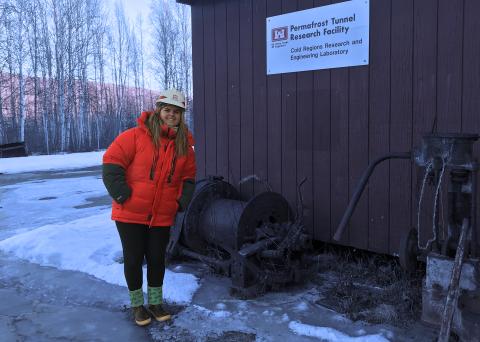
This August, Piper Bartlett-Browne, who graduated from UNH in 2009 with a degree in biology, will be heading to Nome, Alaska, where she’ll spend three weeks with Dr. Lee Cooper onboard the Coast Guard cutter USCGC Healy collecting climate change data in the Bering and Chukchi Seas as a part of the PolarTREC program. She is one of 12 educators from around the country selected to participate the NSF-funded program, which pairs educators with polar researchers. The mutually beneficial connection gives teachers up close experience with the scientific concepts that they teach and gives polar researchers a direct channel for sharing their real-world data and knowledge with students in classrooms thousands of miles away.
Bartlett-Browne, a science teacher at St. Thomas Aquinas High School in Dover, is ecstatic about this opportunity.
“The best way to be an effective science teacher is to be a scientist,” she says. “A lesson on climate change from a teacher who has hands-on field experience is more authentic than from a teacher who does not. My goal is to show students that scientific research is dynamic and that it is about positive change and a better world through knowledge and exploration. This experience is going to have a major impact on the way that I teach and, most importantly, it is going to have such a positive impact on the students that I teach now and into the future.”
Eager to share her PolarTREC adventure with as many people as possible, Bartlett-Browne will be hosting a webinar and blogging from the ship. You can also follow her on Instagram @polarpiperNH.
Piper Bartlett-Browne: I am currently a science teacher at St. Thomas Aquinas High in Dover, NH. I teach high school students biology, marine biology, forensics, and anatomy.
Bartlett-Browne: UNH prepared me to be a teacher by giving my hands-on learning experiences that have translated well to my classroom. I engage my students in inquiry-based learning, which I learned about as a student at UNH. I also made a lot of connections during my time at the university and I have been able to utilize them with my students.
Bartlett-Browne: I see myself continuing to be a teacher in the NH seacoast area. Through new personal and professional experiences, I hope to offer my best teaching to students in the upcoming years. I aim to improve upon my teaching style be participating in more and more teacher workshops that involve research. I want to make research a more integral part of my classroom and inspire students to become the next generation of scientists.
Bartlett-Browne: First of all, I wish that I had known I wanted to be a teacher! I was a biology major and always thought that I would do research. I took the long road to become a teacher. I started in education non-profits and participated in experiential learning on my way to getting my license. I didn't know much about teaching and how many opportunities there are for educators to engage with the scientific community.
Bartlett-Browne: The Field Marine Science course at the Shoals Marine Lab influenced me the most. It was the engaging, hands-on activities that I loved. This is now the foundation of my teaching philosophy. I want my students to ask questions and participate in their own research. I have since been back to SML as a participant in the Marine Science for Teachers program in 2018. I used what I learned there in my marine biology course!
Bartlett-Browne: The most memorable class I took was Marine Invertebrates with Dr. Larry Harris. It was the first time I had ever had such intense lab practicals. I learned a lot about marine invertebrates, which is great because I love tidepools in New England! I remember spending so much time practicing in the lab before the exams. It was difficult, but just knowing that I was capable of being successful in a class that was amazing.
Bartlett-Browne: My advice for people who want to go into science teaching is to be creative and be comfortable reaching out to the science community! Teaching is an amazing field for people are willing to try new things and use their creativity to help students learn in different ways. Scientists and other science professionals are always so willing to help collaborate on curriculum. It can create these great long-term relationships that not only benefits your students, but also engages you in what you are teaching.
Bartlett-Browne: I miss the social aspect of UNH because I had so many great non-academic experiences, but I really do miss taking new classes. A lot of times we read about a topic that is interesting and you get a breadth of information, but it lacks depth. I miss the classes at UNH for the specificity and depth of information that I would receive.
Learn more